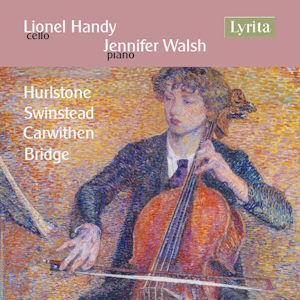
British Cello Works – Volume 3
William Hurlstone (1876-1906)
Cello Sonata in D major (1899)
Felix Swinstead (1880-1959)
Cello Sonata
Doreen Carwithen (1922-2003)
Cello Sonatina (1946)
Nocturne (1943)
Humoresque (1943)
Frank Bridge (1879-1941)
Sonata in D minor for cello and piano, H.125 (1913-1917)
Lionel Handy (cello)
Jennifer Walsh (piano)
rec. 2024, Winchester College, Winchester, UK
Lyrita SRCD441 [79]
In his short life, English composer William Hurlstone left behind a small but outstanding catalogue. It includes such pieces as Variations on a Swedish Air, the Piano Concerto in D major and the Magic Mirror Suite, based on the fairy tale of Snow White. Hurlstone’s extraordinary talent was recognized early on by his teacher, Sir Charles Villiers Stanford, who considered him the most gifted of his students. Sadly, his music is rarely performed today.
Although not well received by the Times critic at its premiere performance, the Cello Sonata in D major has come to be regarded as a minor masterpiece. It was written for the cellist May Mukle. Among four well-balanced movements, the slow movement and the playful Scherzo stand out as highlights. The ‘refrain’ of the concluding Rondo has features that Thomas Dunhill regarded as “unmistakably English in spirit”. Certainly, this sweeping theme gives a good foil to some of the more reflective moments as the movement progresses. The shadow of Brahms is keenly felt as the sonata unfolds. Other stylistic influences include Schumann and Elgar. Yet, the result is none the worse for these debts.
Most pianists of a certain age will have come across Felix Swinstead in their studies. He was an English pianist and composer, familiar for his educational piano music. He studied at the Royal Academy of Music, and became a professor there. He produced around two hundred pieces, mainly for the piano, including Fancy Free and Work and Play. He was known for his recitals and international tours.
The liner notes explain that the present Cello Sonata is undated but Swinstead may well have written it shortly before his death. There are no details of any performances or even a run-through. After a dramatic opening flourish, the Allegro first movement devolves into a charming “strolling tune”. Much of the succeeding music is warm-hearted and downright lyrical. The Adagio is a different matter. Dusk shrouds the proceedings; the main theme is “a wistful, folk-like tune with a decidedly Celtic lilt”. The finale, an Allegro deciso, has all the hallmarks of English light music, as the two main themes explore moods of happiness and of “Elgarian radiance”. This delightful sonata makes no demands on the listener, and is thoroughly enjoyable from the first note to the last. It would be welcome in every duo’s repertoire.
Doreen Carwithen has had a remarkable effect on the record scene in recent years. Most of her orchestral works have been issued on CD. There are albums featuring her chamber music and a few songs. I am guessing that this is the premiere recording of her Cello Sonatina, although the cover does not say so.
Carwithen’s Sonatina is in three movements, with the central fast one. The opening Andante is melancholy and sometimes troubled. The Allegro is a breath of fresh air, with lots of questions and answers between instruments. It sounds technically demanding. The final movement returns to the melancholic mood, as the cello weaves a tender and serene melody. It is another example of a work which begs the question: “Why is it not heard in the recital rooms?” (The track listing has the piece as Sonata in E minor for cello and piano op.132 from 1951, which are the details of a sonata by Cecil Armstrong Gibbs!)
Carwithen’s two other short numbers here are the introspective Nocturne and the energetic Humoresque.
Frank Bridge, the English composer, violist and conductor needs little introduction in these pages. He is well remembered for his chamber music and orchestral works. He was a mentor to Benjamin Britten, and that tends to detract from the appreciation of his own work. Bridge’s compositions evolved from romanticism to a more modernist style, reflecting the emotional and societal shifts of his time.
I heard the Rostropovich/Britten recording on Decca (SLX 6426) of Bridge’s Sonata in D minor for cello and piano in the early 1970s, and it has been one of my Desert Island works. It has everything, from high romanticism to hints of Bergian “modernism”. It took four years to finish, so its gestation spans the years of the First World War. Other major chamber works from Bridge’s pen during that period are the Sextet (1912) and the String Quartet No. 2 in G minor (1915).
The clue to appreciating Bridge’s Cello Sonata is to see the “fundamental dichotomy between a pre-war pastoralism and the angry reaction to the horrors of the conflict”. Its two movements are Allegro ben moderato and Adagio ma non troppo. The first is a celebration of the high-water mark of Edwardian triumphalism, with echoes of Brahms and even Rachmaninov. The second, fraught with grief and angst, comes to a surprisingly optimistic conclusion. Cellist Lionel Handy and pianist Jennifer Walsh give it a superb performance.
(The track listing on the rear cover says that Frank Bridge’s dates are 1913-1976, and that the cello sonata dates from 1961! It is not the Sonata in C for cello and piano op.60 from 1961, which belongs to Benjamin Britten.)
Paul Conway’s liner notes are to the usual high standard: an essay-long introduction to the composers and the music. No resume of the two soloists is included.
All this music is played with obvious skill and enthusiasm. Swinstead’s piece is my discovery on this album, but Bridge’s sonata is the highlight for me. I will certainly listen to this version many times in the future.
John France
Buying this recording via a link below generates revenue for MWI, which helps the site remain free


Previous reviews: Jonathan Woolf (January 2025) ~ Philip Harrison (February 2025)

















